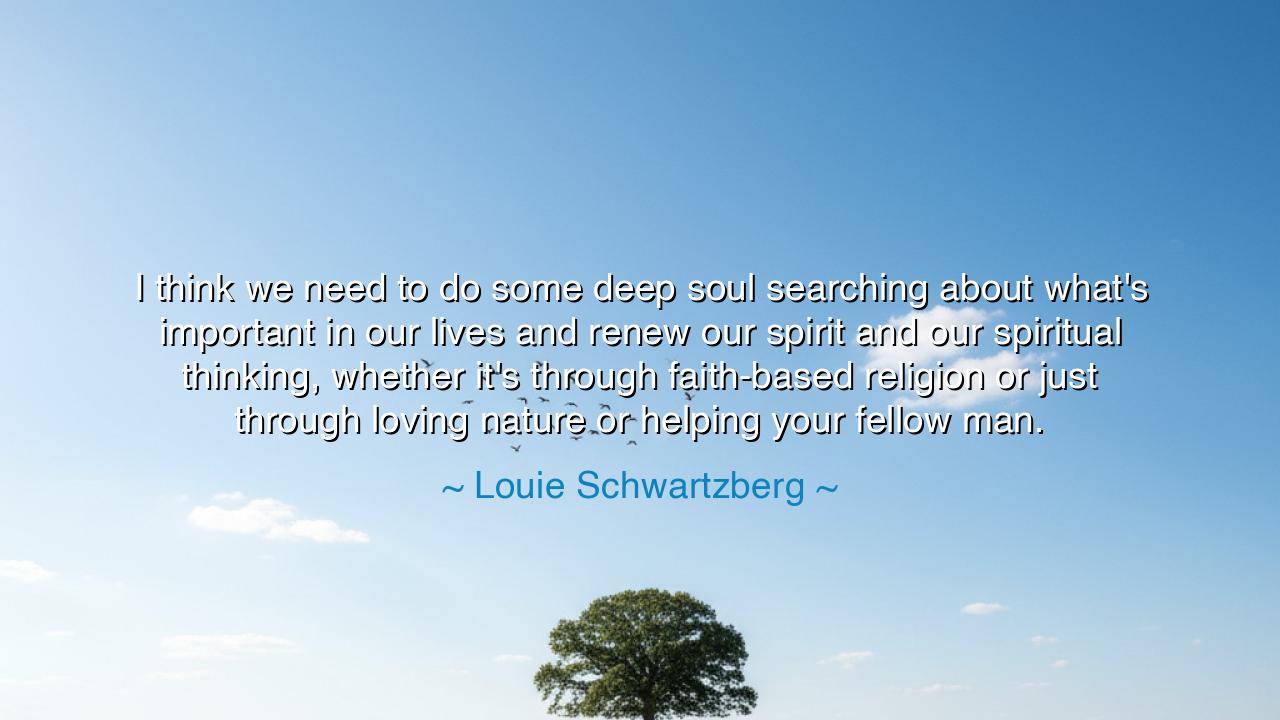
I think we need to do some deep soul searching about what's
I think we need to do some deep soul searching about what's important in our lives and renew our spirit and our spiritual thinking, whether it's through faith-based religion or just through loving nature or helping your fellow man.






The words of Louie Schwartzberg — “I think we need to do some deep soul searching about what's important in our lives and renew our spirit and our spiritual thinking, whether it's through faith-based religion or just through loving nature or helping your fellow man” — rise like a gentle wind that stirs both heart and conscience. They are not the words of a preacher, but of a seer — one who has gazed upon the beauty of the world and the weariness of its people, and who calls humanity to awaken once more to meaning, to gratitude, and to connection. In a time when the world rushes endlessly forward, Schwartzberg reminds us of an ancient truth: that the soul, if not renewed, withers in the noise of ambition. To live fully, one must pause and look inward, to rediscover the sacred pulse of life itself.
This call to soul searching is as old as civilization. The prophets of old, the sages of the East, and the philosophers of Greece all spoke of the same need — to know oneself, to ask what truly matters, to balance the outer life of action with the inner life of reflection. Schwartzberg, a filmmaker of nature’s wonders, speaks in that same lineage. His message carries the humility of one who has watched a flower unfold and seen eternity in its petals. He teaches that spiritual renewal is not confined to temples or scriptures, but can be found wherever the heart opens — in prayer, in compassion, in the quiet awe of sunlight upon the earth.
To “renew our spirit,” as he says, is not to abandon the world, but to restore harmony between the human and the divine, between doing and being. The ancients knew that man, when detached from spirit, becomes like a tree without roots — capable of growing tall, yet destined to fall with the first storm. In Schwartzberg’s vision, the modern soul has grown weary from disconnection — from nature, from kindness, from purpose. Thus, his call is not a sermon of guilt but an invitation to remembrance: to remember that life is more than labor, that love is more than possession, and that joy is found not in having, but in being present.
Consider the story of Saint Francis of Assisi, who once lived amid wealth and comfort, but found his true calling in simplicity and service. He spoke to birds as brothers, to the sun as a friend, and to the earth as his mother. His spirituality was not confined to church walls — it lived in every breath, every act of mercy, every song of creation. Francis’s renewal came not through ritual, but through love — the same love Schwartzberg invokes when he speaks of “helping your fellow man” and “loving nature.” The spirit, once awakened to compassion, finds divinity in every living thing.
In our own time, when technology stretches our attention thin and the world’s pace leaves little room for wonder, this message becomes more urgent. Many chase wealth, fame, and success, only to find emptiness where meaning should dwell. Schwartzberg’s wisdom challenges us to recalibrate our values, to ask what truly nourishes the soul. Is it the possession of things, or the practice of gratitude? Is it constant noise, or quiet reflection? Is it the endless pursuit of gain, or the simple joy of kindness? The answer, he suggests, lies not in ideology, but in awakening — a spiritual re-rooting that reconnects us with what is eternal.
There is profound humility in his words: whether one finds renewal “through faith-based religion or just through loving nature,” the path is valid. This is the inclusivity of true wisdom — it does not demand one road, but honors the diversity of human seeking. Some find peace in the stillness of a forest, others in prayer or song, others in service to the poor. What matters is not the form, but the intent — the turning of the heart toward the good, the sacred, the interconnectedness of all life. For every soul that acts from love becomes a light in the world, renewing not only itself but the world around it.
The lesson, then, is both gentle and profound: the world will not be healed by progress alone, but by people who remember who they are. To heed Schwartzberg’s call is to make time for reflection, to nurture gratitude daily, to touch the earth and feel its pulse, to offer kindness freely, to live deliberately rather than reactively. In doing so, we renew the spirit — and through that renewal, we restore balance to our lives and our world.
Therefore, let all who hear these words pause in their striving. Sit beneath the sky, breathe deeply, and ask the ancient question: What truly matters? Let the answer come not from fear, but from the quiet wisdom of your soul. For when the spirit is renewed — whether in prayer, in service, or in the beauty of creation — life becomes once more what it was meant to be: a sacred act of wonder, a hymn of gratitude, a living expression of the divine within us all.






AAdministratorAdministrator
Welcome, honored guests. Please leave a comment, we will respond soon